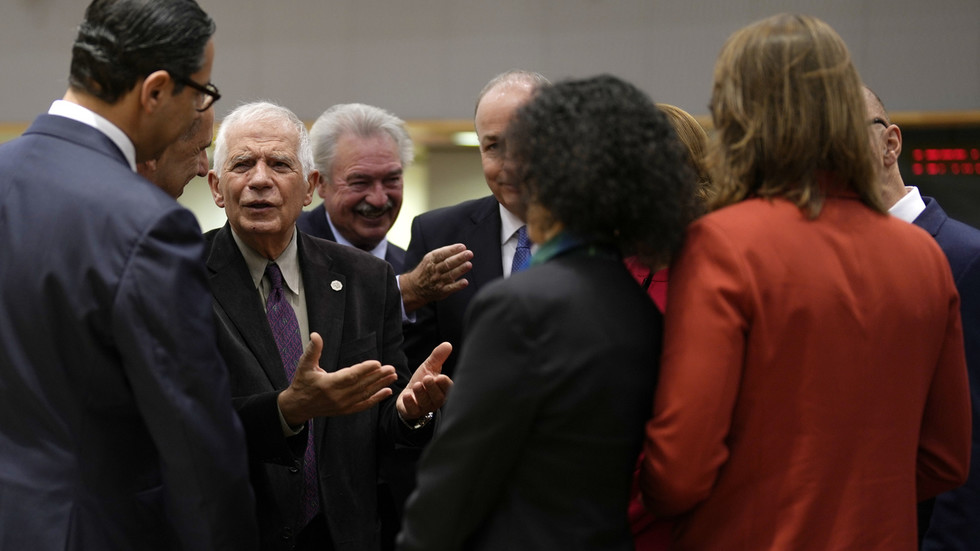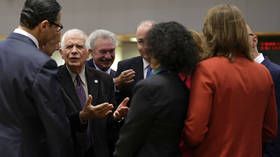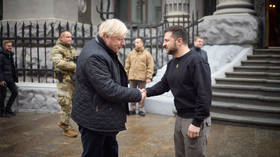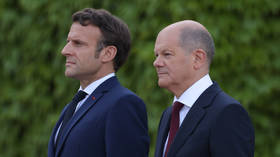
The Western European bloc’s representatives no longer try to understand those who disagree with them, instead they deliver lectures dripping with arrogance
By Timofey Bordachev, Programme Director of the Valdai Club

European Union foreign policy chief Josep Borrell, third left, on a meeting of EU foreign ministers at the European Council building in Brussels, Monday, Nov. 13, 2023. © AP Photo/Virginia Mayo
A recent incident in which a group of ambassadors from EU states refused to attend a meeting with Russian Foreign Minister Sergey Lavrov perfectly encapsulates the state of European diplomatic culture today. The reason is simple – over the past 30 years, the need to be diplomatic in the traditional sense of the word has almost disappeared.
Despite the fact that the envoys of EU countries in Moscow are relatively well-educated and not stupid, these individual peculiarities no longer count for much. Everything is determined by their dogmatic world view, which has become the opposite of what is necessary for civilized relations between states. And those observers who believe that in today’s conditions, it has become unnecessary to have ambassadors of individual EU states in Moscow, have merit in their arguments. After all, they do not decide anything and cannot fulfil their duties in the traditional accepted way. It would be much easier for everyone if these people – both great and not so great – would return to their countries for a while.
There are several reasons why Western Europeans have ventured so far on the road to their own, different world. First, they experienced a colossal upheaval just over 30 years ago. Since the 16th century, these states had been neighboring Russia, which they could not defeat.
Dominic Lieven, a fine British scholar of Russian Empire origins, wrote in one of his works that the Russians were the only people Western Europeans had to deal with who were capable of fighting for their special, independent niche in the modern world with boundless courage, perseverance, and self-sacrifice.
Consider these words – we are the only civilization against which the West has attempted to act aggressively, and failed to achieve its goals. All the rest – the Great Empire of China, the ancient civilization of India, and many others – were unable to withstand the decisive thrust of the West, which for 500 years had been expanding the frontiers of its power by fire and sword. They were beaten, even if they were able to restore their statehood after some time.

Read more
Our country was never defeated. But let’s try to put ourselves in the Western Europeans’ shoes and understand their emotional state. For centuries, they have been living with a trauma called ‘an independent Russia’. However, we ourselves have never had the opportunity to understand what it is like to have a permanent enemy that can never be conquered.
So, when the USSR suddenly collapsed in 1991 and the unified state disintegrated, Western Europe found itself in a situation it had never experienced before. Overnight, the most unfulfilled wish of generations of European politicians and military leaders came true. All by itself, without a decisive military clash, and with the Russians’ full of desire to join the ‘European family’, even as pupils. Such a shock could not pass without serious consequences for the psyche of the statesmen and ordinary citizens of these Western European states.
Their entire foreign policy culture was based on the fact that Russia would never be pushed around or told what to do. Suddenly, the West felt it had won the Cold War without firing a single shot. In a state of fantastic emotional upheaval, the Western Europeans began to build relations with Russia as if it had finally been defeated. For several years, Moscow accepted the rules of the game that the West imposed. It took into account the wishes of the Western Europeans in the economic sphere and developed its foreign relations with an eye to how this would affect the main goal – which was gradual ‘integration’ with the EU. In the new circumstances, the bloc found itself in the position of a demanding teacher, offering numerous ‘partnership’ programs with two simple objectives. First, to secure the interests of Western European business and make the Russian market even more open to it. Second, to ensure that Moscow was complying with its instructions.
European diplomats became equally demanding teachers. For several generations of EU ambassadors in Moscow, the main task was to monitor how well Russia was honoring its many commitments. As part of this ‘honorable’ mission, a tradition of communication with Russians at various levels has developed. And while there have been talks at the level of heads of state or foreign ministers, there has been no trace of normal diplomacy below that level.
EU ambassadors did not simply become the executors of the will of their masters back home (which is perfectly normal) – they gradually became technical workers entrusted with the task of observing Russia and pointing out errors in its behavior. And the level of their intellectual ability was no longer measured by their competency in playing a subtle diplomatic game. The main measure was the degree of hysteria with which they pushed through a very simple agenda of mere demands. All the more so as their individual will and intelligence were increasingly integrated into the system of rules and requirements common to all NATO and EU representatives abroad.

Read more
As a philosopher wrote in the last century, “in any collective, individual agency becomes the servant of the collective interest.” And gradually, we should add, it disappears in the sense that is a sign of agency in the first place – the ability to analyze a situation independently and to make decisions. This problem has become so total for Western European diplomacy and politics that it has gradually ceased to be noticed.
All the more so because European politics was also changing rapidly. Having found themselves, through no fault of their own, in the position of ‘winners of the Cold War’, Western Europeans felt a deep sense of moral superiority over the whole world around them. Except, of course, towards the Americans, who they are simply afraid of.
We have repeatedly seen examples of the European Union interfering in the purely internal affairs of key partners such as China, or the still very friendly India. Not to mention states of lesser size and importance. Last year, for example, French President Emmanuel Macron made a scene with the Brazilians over their treatment of their forests.
To be fair, part of the problem is that other countries have long been unwilling to make these Western Europeans aware of the inadequacies of their behavior. As a participant in global diplomacy, the EU has gone very far down the road to a place from which there is no return to reality.
However, a reasonable question arises – why does Russia care at all why our neighbors to the West have lost so much of their ability to adapt to the world around them? It seems that if the current political-military crisis is temporarily accompanied by a downgrading of our diplomatic relations with EU countries, we might still benefit from understanding the reasons.
Firstly, if we exclude tragic scenarios for everyone, the bloc will remain Russia’s neighbor and we will have to resume diplomatic dialogue with it. Even if we take into account the fact that the main reason for Western European inadequacy has been of a fundamental nature – the end of the Cold War and the collapse of the USSR – we could have been more demanding with them earlier. For their own – and our common – good. It is therefore necessary to understand where they have major weaknesses that deprive them of the ability to engage in normal diplomatic interaction.
Secondly, we must recognize the tragic errors of replacing diplomacy with political lectures. As Russia develops relations with the Global South and our neighbors in the former Soviet space, it is useful to be extra vigilant and make sure that we ourselves do not also start displaying some signs of European arrogance.
This article was first published by ‘Vzglyad’ newspaper, translated and edited by the RT ream




